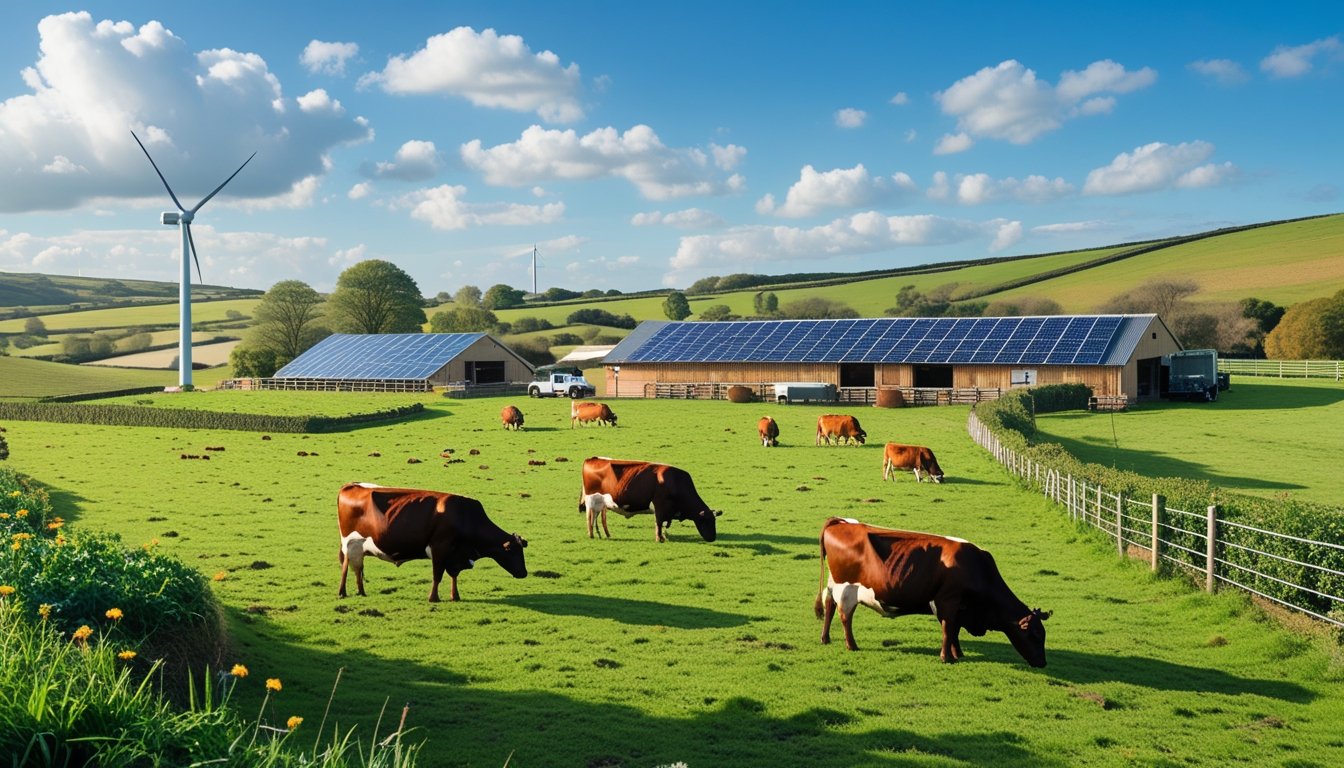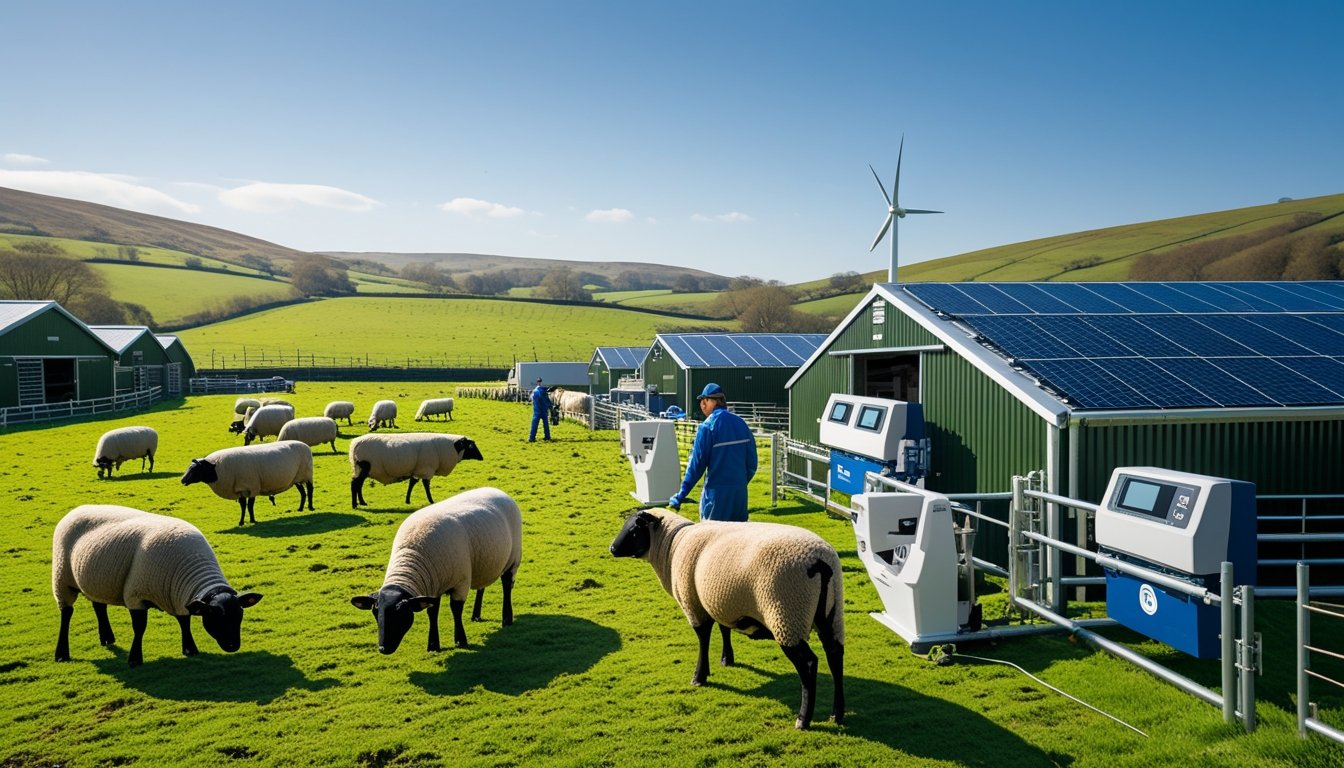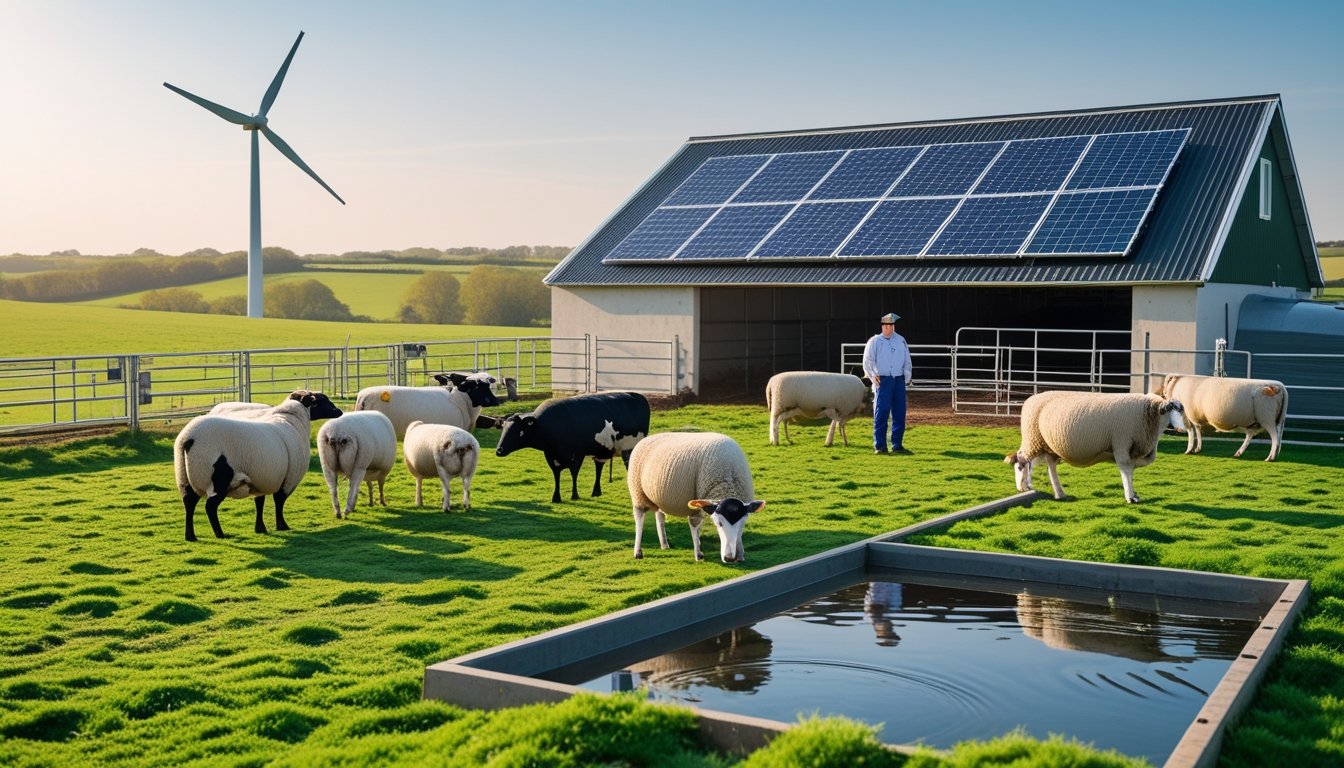Late updated: 08 Jun 2025 12:06
Written by: Oliver Bennett
Eco-Friendly Innovations For UK Countryside Livestock Farms: Sustainable Practices and Technologies
Exploring the rolling hills of the UK countryside, we often marvel at the traditional beauty of livestock farms. As charming as these farms are, there's a growing need to embrace innovative practices that prioritise environmental sustainability alongside agricultural productivity. Utilising eco-friendly innovations in livestock farming, such as methane-reducing feed additives and renewable energy options, can significantly cut down emissions and enhance farm efficiency. This is not only beneficial for the planet, but it also promises better animal welfare and optimised production costs.

The UK is leading the charge in embracing these innovations, with projects ranging from automation in livestock care to modular insect farms for sustainable protein sources. By adopting technologies designed for the specific needs of each farm, we are not only boosting efficiency but also adapting to the unique climates and landscapes of the UK countryside. Our commitment to eco-friendly practices positions us at the forefront of a global movement towards sustainable agriculture.
Immersing ourselves in these cutting-edge methods provides an opportunity to reshape the farming landscape. There is much to gain from understanding the interplay between technology and traditional farming, ensuring that we sustain both the environment and our agricultural heritage for the generations to come.
Key Takeaways
- Eco-friendly innovations reduce emissions in livestock farming.
- The UK is a leader in adopting sustainable agricultural technologies.
- Balancing tradition and innovation ensures future farming success.
Fundamental Eco-Friendly Innovations For UK Livestock Farms
The integration of eco-friendly innovations is transforming livestock farming in the UK. Our focus is on combining technological advancements with sustainable agricultural practices to improve animal welfare, protect biodiversity, and mitigate climate change.
Precision Agriculture Technologies
Incorporating precision agriculture technologies enables us to enhance productivity while minimising environmental impacts. Utilising GPS systems and sensors, we can monitor livestock health, nutrition, and movement, leading to more efficient resource use and improved animal welfare.
By analysing data, farmers can make informed choices about feeding practices, reducing waste and ensuring optimal growth conditions. This technology provides insights that support better decision-making, enhancing sustainable livestock management.
Regenerative and Organic Farming Approaches
Regenerative farming focuses on improving soil health and fostering biodiversity conservation. By adopting practices like crop rotation, cover cropping, and minimal tillage, we can restore soil structure and fertility. These practices contribute to sustainable pasture management, benefiting both livestock and the environment.
Incorporating organic farming principles further reduces chemical usage, promoting natural ecosystems. Feeding livestock with organic produce ensures healthier animals and products for consumers, aligning with our commitment to environmentally responsible farming.
Sustainable Livestock Management
Sustainable livestock management is crucial for maintaining a balance between productivity and environmental conservation. Strategies such as rotational grazing can enhance grassland health, sequester carbon, and prevent soil erosion.
Moreover, implementing animal welfare and nutrition plans ensures livestock health, reducing the need for antibiotics and enhancing the overall sustainability of farming operations. Our efforts align with DEFRA's goals to improve agricultural sustainability and animal health.
Agroforestry and Biodiversity Conservation
Agroforestry integrates trees with agricultural systems, providing multiple benefits such as enhanced carbon sequestration and improved biodiversity conservation. By planting trees along pastures, we can create habitats for wildlife, improve landscape aesthetics, and offer shade and shelter for livestock.
Trees also improve soil quality and reduce erosion, supporting sustainable farming. This approach complements our eco-friendly initiatives, contributing to a more resilient agricultural ecosystem while addressing climate change challenges.
Technological and Practical Applications On Countryside Farms

Our countryside livestock farms are increasingly adopting innovative technologies and practical solutions to boost productivity while reducing environmental impacts. Embracing renewable energy, waste management, and efficient water use can dramatically transform farm operations.
Renewable Energy Integration
Integrating renewable energy sources such as wind and solar power is becoming vital for reducing reliance on fossil fuels. By installing solar panels or wind turbines, farms can generate clean energy, cutting electricity costs and greenhouse gas emissions.
Biogas systems, deriving energy from animal waste, offer dual benefits: providing sustainable energy and reducing methane emissions. These technologies not only enhance farm profitability but also aid in lowering the overall carbon footprint, aligning with broader environmental goals.
Efficient Waste Management and Compost Systems
Efficient waste management is crucial for maintaining farm sustainability. By implementing composting systems, farms can recycle animal waste and produce nutrient-rich compost, enhancing soil quality.
Minimizing waste reduces greenhouse gas emissions, contributing to environmental conservation. Advanced techniques such as anaerobic digestion can further break down organic waste, transforming it into bioenergy. This approach not only boosts productivity but also supports the bioeconomy by converting waste into valuable resources.
Smart Irrigation and Water Resource Efficiency
Adopting smart irrigation systems is essential for optimising water usage on farms. These systems, coupled with IoT sensors and soil moisture sensors, allow precise monitoring and control of water distribution, ensuring crops receive water as needed.
This technology reduces water waste and improves farm efficiency. Additionally, drone technology can monitor crop health and water needs from above, enhancing resource efficiency. Such innovations are critical in improving production capacity while ensuring sustainable water use, supporting food security in the context of growing populations.
Frequently Asked Questions

Eco-friendly technologies are transforming the landscape of UK livestock farming. Key areas include sustainable practices, renewable energy adoption, animal welfare improvements, and adherence to sustainable intensification goals.
What are the emerging eco-friendly technologies being utilised on UK livestock farms?
UK livestock farms are increasingly embracing technologies such as methane-reducing feed additives and enhanced manure management. These innovations play a significant role in reducing greenhouse gas emissions. Improved grazing practices are also gaining traction, supporting both environmental sustainability and increased productivity.
How are UK livestock farms implementing sustainable farming practices?
Sustainable farming practices are being adopted through crop rotation, biodiversity enhancement, and integrated pest management techniques. By combining these methods, farms not only improve resilience and productivity but also foster a thriving natural ecosystem. These practices aim for a more balanced approach to farming activities.
What advances have been made in sustainable cattle farming in the UK?
In sustainable cattle farming, the UK has made strides by incorporating practices like rotational grazing and genetic selection for improved efficiency. These efforts reduce the environmental impact of cattle farming while maintaining high standards of animal productivity and well-being. Such initiatives contribute to a more sustainable agricultural model.
In what ways are UK farming practices conforming to sustainable intensification objectives?
Farms are aligning with sustainable intensification by maximising outputs while minimising resource inputs. Technologies such as precision agriculture and vertical farming allow for increased yields with reduced environmental footprints. Here, the aim is to produce more with less, enhancing both economic and ecological outcomes.
Which renewable energy sources are UK livestock farms adopting to minimise environmental impact?
Renewable energy sources such as biogas systems and solar panels are increasingly being used on livestock farms. Biogas systems convert organic waste into usable energy, while solar power helps reduce reliance on traditional energy grids. These sources contribute significantly to reducing the carbon footprint of farming operations.
How is the welfare of farm animals being addressed alongside eco-friendly farming in the UK?
Animal welfare is being prioritised alongside eco-friendly initiatives. Improved housing conditions, stress reduction techniques, and better nutrition strategies are being implemented. These measures ensure that the shift towards sustainable farming does not compromise the well-being of livestock, instead enhancing their quality of life.
